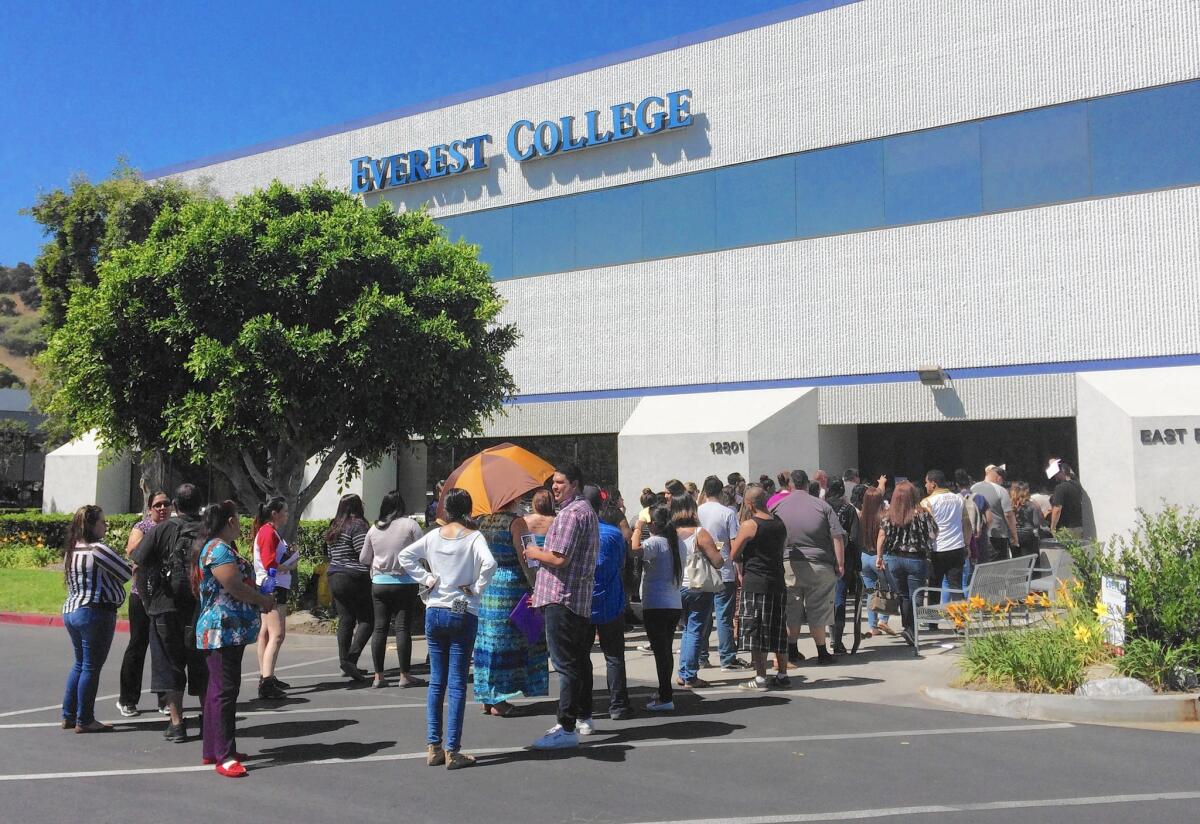O.C. firm Corinthian Colleges files for bankruptcy protection

Over two decades, Corinthian Colleges Inc. grew from a small collection of trade schools into a publicly traded powerhouse with more than 100 campuses and 110,000 students in 2010.
On Monday, the Santa Ana company filed for bankruptcy, a week after abruptly closing the doors on two dozen remaining campuses and 16,000 students. In its Chapter 11 bankruptcy filing, the company listed debts of $143 million and assets totaling $19.2 million — a stunning reversal from five years ago, when Corinthian listed total assets of nearly $1.4 billion.
The move ends years of troubles for Corinthian, once among the nation’s largest for-profit education providers, but the bankruptcy case raises new questions about the company’s ongoing legal entanglements with federal and state regulators.
Just last month, the U.S. Department of Education levied a $30-million fine against Corinthian, alleging that its Heald College system boosted official placement rates by paying temporary employment agencies to hire students for brief stints after graduation. The company faces additional lawsuits alleging fraudulent marketing and financial practices, including cases filed by the U.S. Consumer Financial Protection Bureau and California Atty. Gen. Kamala D. Harris.
Typically, all outstanding litigation against a company is halted in bankruptcy, then brought under the purview of the bankruptcy court, experts said. The bankruptcy judge would then prioritize those cases just as it would any other financial creditor seeking to recover money that is owed.
“The idea is to get everyone before the same judge,” said John Pottow, a bankruptcy expert and professor at University of Michigan’s law school. “The idea is that if you’re in default on all your debts, you don’t want a million different lawsuits going on in different courtrooms.”
In the case of Corinthian, the $30-million fine alone is more than the company’s remaining assets, making it unlikely Corinthian would be able to pay off that fine or other penalties stemming from similar litigation.
Bankruptcy cases are essentially a way to dole out an insolvent company’s remaining assets to those deemed to have the highest priority. Corinthian’s filing listed outstanding obligations of more than $100 million to various banks lending money to the company, and an estimated $100 million more in unsecured debts and regulatory penalties.
Denise Horn, a spokeswoman for the Department of Education, said the agency will “pursue all of our options through the bankruptcy proceedings” to secure as much of the $30 million as possible. A spokeswoman for the Consumer Financial Protection Bureau said the case is ongoing, but declined to comment further.
The California attorney general will “continue to vigorously pursue relief for the thousands of students harmed by Corinthian’s predatory conduct,” spokeswoman Kristin Ford said.
In some rare cases, Pottow said, the judge may decide to lift the stay on a pending case against a company filing for bankruptcy if it’s deemed too complicated to handle. But generally, he said, the government “has to share with everyone else” and wouldn’t get special treatment in a bankruptcy case.
“Bankruptcy is quick, it’s sweet, it’s dirty and it’s incredibly efficient,” he said.
Corinthian has been in free-fall since last June, when the Department of Education restricted its access to federal financial aid amid concerns that the company was falsifying job placement rates for graduates. The company sold off 56 campuses to a nonprofit student loan servicer in November but was unable to sell off its remaining schools.
In its bankruptcy filing Monday, the company’s chief restructuring officer, William Nolan, wrote that regulatory scrutiny from the Department of Education and the California attorney general’s office prevented the sale of Corinthian’s remaining schools in recent months.
Nolan works for FTI Consulting Inc., which worked on the bankruptcy of MF Global Holdings, the brokerage firm run by former New Jersey Gov. Jon Corzine that collapsed in 2011 after losing $1.6 billion of its customers’ money.
The filing said the company was close to an agreement with at least three buyers for Corinthian’s Heald schools, but noted the Department of Education sought to impose “significant financial and operational conditions” on Corinthian and potential buyers that made a final sale impossible.
Corinthian has very few real estate assets that can be sold off to generate cash. Over the last few years, as the company struggled with declining enrollments, Corinthian sold off many of its buildings and leased them back.
Meanwhile, students left in the wake of Corinthian’s collapse still face significant challenges. Those who attended one of the more than two dozen schools shut down last week must choose to either transfer credits — knowing many institutions won’t recognize them — or seek to wipe out their debt and start over.
A group of former Corinthian students is also staging a student debt “strike,” refusing to pay debts owed for Corinthian education until the Department of Education agrees to a blanket loan forgiveness.
A group known as the “Corinthian 100” was scheduled to meet Monday with the Department of Education, but they canceled the meeting because of concerns that the department would pursue student debt relief on a case-by-base basis instead of offering more broad loan discharges.
In an email to the group Monday, Undersecretary of Education Ted Mitchell said the department had made no final decisions on how the process would work.
“Nothing we can do will give you back the time you invested at Corinthian,” Mitchell wrote. “But we can make the process of forgiving loans fair, clear and efficient.”
More to Read
Inside the business of entertainment
The Wide Shot brings you news, analysis and insights on everything from streaming wars to production — and what it all means for the future.
You may occasionally receive promotional content from the Los Angeles Times.










